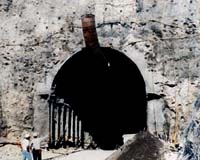 |
Moscow (AFP) Dec 1, 2010 Russia announced Wednesday that it had created the world's first international atomic fuel bank as part of a global effort to curb the spread of nuclear arms to nations such as North Korea and Iran. The Rosatom state atomic energy corporation said the Siberian fuel reserve -- which will operate under the auspices of the United Nations' International Atomic Energy Agency (IAEA) nuclear watchdog -- will have enough material to refuel two civilian nuclear power plants. "The purpose of this facility is to reduce the risk of other countries processing their own uranium to a minimum," former Foreign Intelligence Service chief Gennady Yevstafyev told AFP. "This will dramatically improve control over the proliferation of nuclear weapons." The Angarsk bank is the first of about a dozen facilities proposed by various nations following the 2003 discovery of covert enrichment activity in Iran. The plant now stores 120 tonnes of low-enriched uranium (LEU) that has been enriched to between two and 4.95 percent. Scientists say it can satisfy the electricity needs of a 12-million-strong city for up to a year. The fuel is considered safe because the weapons-grade uranium desired by nations seeking to build nuclear weapons must be enriched to at least 90 percent. The IAEA approved the Russian reserve's creation at a historic but contentious two-day meeting in November. The type of fuel stored in Angarsk is used by most of today's civilian nuclear power plants. Russia first proposed the idea to the IAEA in September 2007 amid fears here that supply cutoffs could be used by Western nations for political purposes. "This bank was created under the Russian president's initiative to form a global nuclear energy infrastructure (that would ensure) reliable compliance with the nuclear weapons non-proliferation regime," Rosatom said in a statement. Then-president Vladimir Putin first forwarded the nuclear fuel bank initiative in January 2006 amid a resumption of nuclear dialogue between Russia and the United States. Moscow and Washington signed their own peaceful nuclear cooperation deal -- known as the 123 Agreement -- two years later and the two sides then both pushed for the bank's approval at the IAEA. The idea was backed by 23 of the 35 IAEA members at the Vienna meeting but opposed by countries such as Brazil and Pakistan that are just beginning to establish their own nuclear programmes. "The main problem with nuclear energy is that countries try to develop their own nuclear fuel cycles," Yevstafyev said in reference to the independent production and enrichment of uranium -- an ability perfected by a limited group of states. "And this cycle is then turned around and focused on developing nuclear weapons. This plant should help stop that." The Angarsk announcement comes one week after Russia and the IAEA signed a separate agreement on developing a joint training programme for nuclear experts who could then be employed at the various facilities across Russia. Officials here have voiced fears that they no longer have the scientists and experts they did in the Soviet era to safely operate the country's vast network of nuclear facilities.
Share This Article With Planet Earth
Related Links Nuclear Power News - Nuclear Science, Nuclear Technology Powering The World in the 21st Century at Energy-Daily.com
 Study Assesses Nuclear Power Assumptions
Study Assesses Nuclear Power AssumptionsWashington DC (SPX) Dec 01, 2010 A broad review of current research on nuclear power economics has been published in the Journal of Renewable and Sustainable Energy. The report concludes that nuclear power will continue to be a viable power source but that the current fuel cycle is not sustainable. Due to uncertainty about waste management, any projection of future costs must be built on basic assumptions that are not grounded ... read more |
|
| The content herein, unless otherwise known to be public domain, are Copyright 1995-2010 - SpaceDaily. AFP and UPI Wire Stories are copyright Agence France-Presse and United Press International. ESA Portal Reports are copyright European Space Agency. All NASA sourced material is public domain. Additional copyrights may apply in whole or part to other bona fide parties. Advertising does not imply endorsement,agreement or approval of any opinions, statements or information provided by SpaceDaily on any Web page published or hosted by SpaceDaily. Privacy Statement |